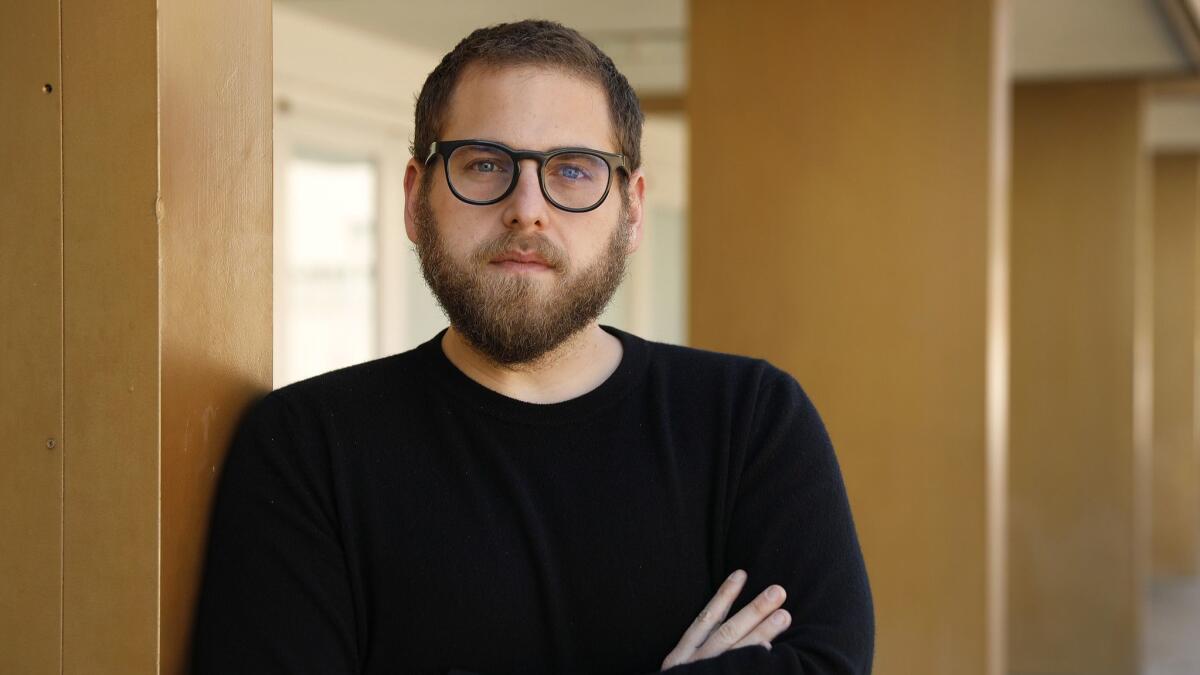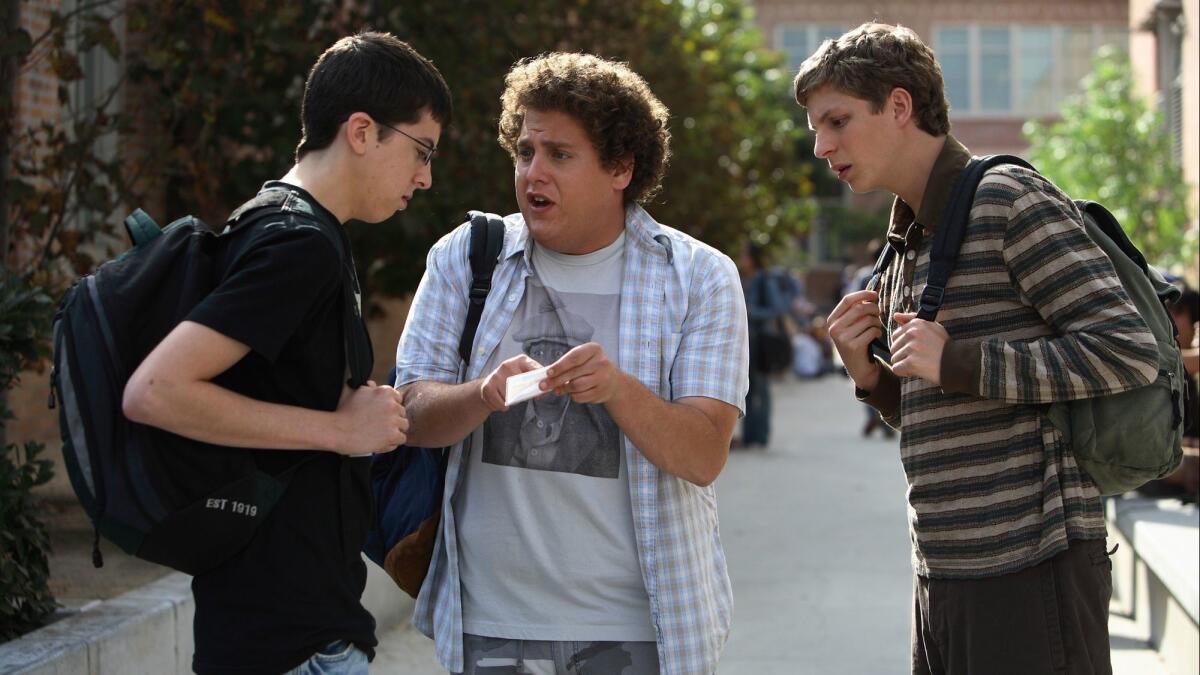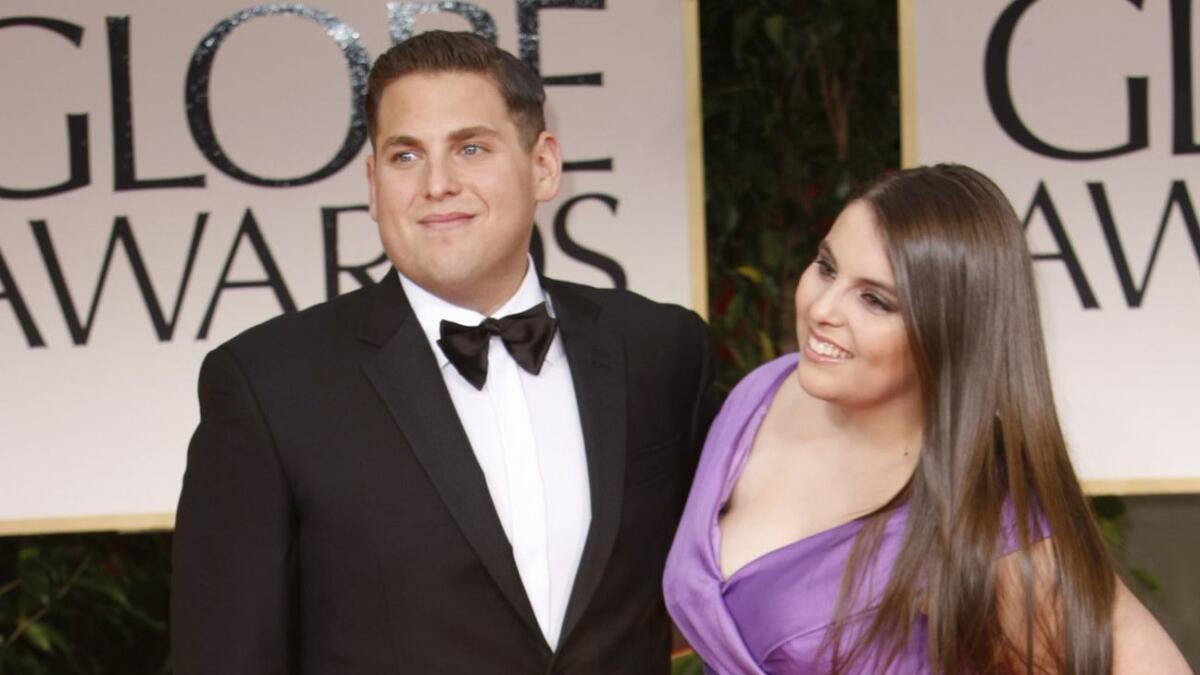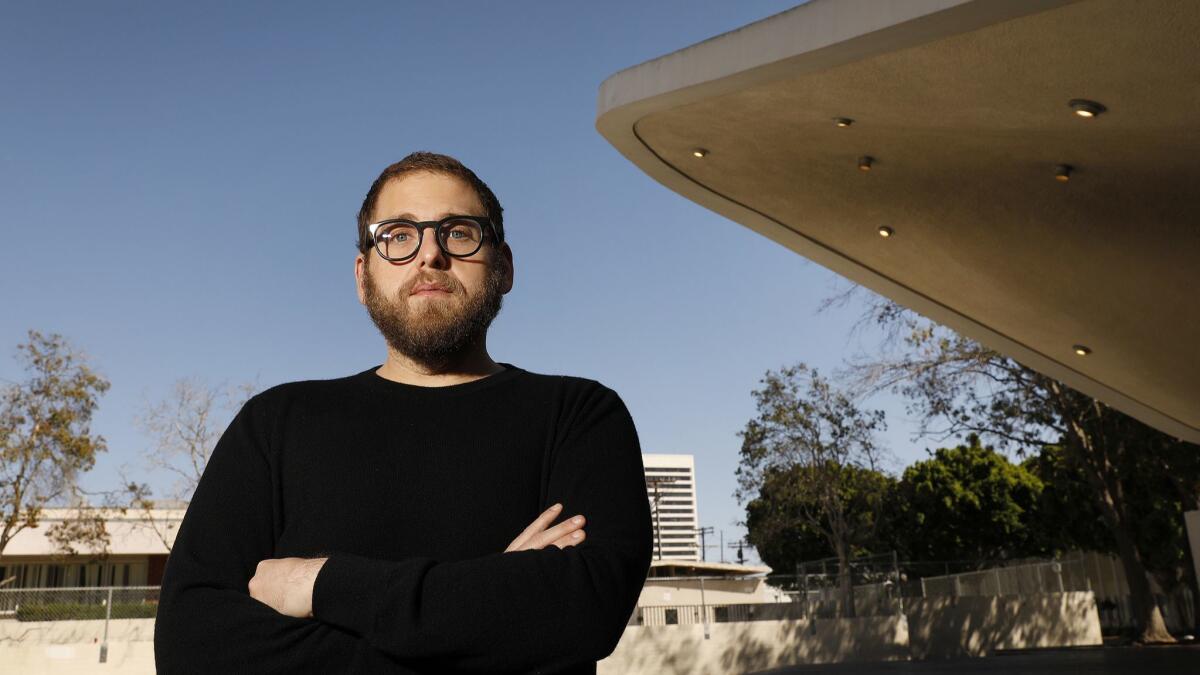Jonah Hill returns to his West L.A. stamping ground for his directorial debut, ‘Mid90s’

- Share via
The first time Jonah Hill’s mom dropped him off at the West L.A. Courthouse, she didn’t want him to get out of the car. He’d told her this was his favorite place to skateboard — the spot where he and his buddies had been hanging after school. But seeing it in person — a dingy cement courtyard populated by homeless people and flanked by a bail bonds shop — she thought it was too seedy for her 10-year-old son.
But he couldn’t just stop going. As a preteen, Hill was desperate to find his tribe, and he’d recently fallen in with a group of skaters who hung out at the Hot Rod shop on Westwood Boulevard. He idolized them — these kids in their baggy jeans and beanies who seemed to flow through life, tackling every risk with rebellious spirit.
“Skating came into my life when I really needed it,” recalled Hill, now 34. “If you feel like an outsider, sometimes that can make you harsh or angry. And I think skating is for an angry group of outsiders — slamming on the floor, saying mean things to one another — but ultimately really, really deeply loving one another.”
He was sitting on the concrete steps of his childhood haunt earlier this week, watching the sole skater at the park attempt some low-key tricks. Hill brought his laptop to these steps to write “Mid90s,” his directorial debut, many times over the past few years. Though Hill insists the movie is not autobiographical, it contains numerous parallels to his youth: The protagonist, Stevie (Sunny Suljic) is a 13-year-old living in 1990s Los Angeles who finds refuge from his troubled home with a bunch of unruly teens at a local skate shop.
“Writing this was healing for me,” acknowledged Hill, whose film premiered at the Toronto International Film Festival last month and opened in limited release Friday. “There’s a line in the movie where Stevie is told: ‘You take the hardest hits out of anyone I know. You know you don’t have to do that, right?’ His friend is telling him, ‘We don’t love you because you fall off of roofs and get the [crap] kicked out of you. We just like you.’… [Stevie] is not me, but those are things I would have liked to have learned a lot earlier in life.”
Hill knows what it’s like to take a hit. He got famous in his early 20s as the star of 2007’s “Superbad” and was quickly branded as Hollywood’s go-to goofy, chubby comedian. Even though he’s flashed some serious dramatic chops in the past decade — earning Oscar nominations for his roles in Bennett Miller’s “Moneyball” and Martin Scorsese’s “The Wolf of Wall Street” — he said he has still felt an expectation from the public to be funny.
“I was like, ‘Oh, people just want me to be funny, so I’ll just be funny,’ but I wasn’t being true to myself,” he said, the Santa Ana winds swirling leaves around his feet. “I thought if I was funny, it allowed people to make fun of me. And that’s on me — not everybody else. Being a young man coming up in this business, I didn’t have the self-love or self-understanding or strength to be myself. And then I got pent up so bad that I got angry.”
And his anger often manifested in public. After being harassed by a paparazzo in 2014, he lashed out and lobbed a homophobic slur at the photographer. (He quickly apologized for his “hurtful” and “grotesque” language.) The incident followed an infamous 2013 interview with Rolling Stone where, in response to playful questions about his workout routine and masturbatory habits, even Hill now admits he came off as a self-serious “dick.”

“You’re young and you’re egotistical and you think you deserve to be understood,” he said. “I’d do an interview that would go poorly because the person wouldn’t be sensitive or would think because I was — I think a lot of it has to do with weight and people, how they view funny. If you’re funny and overweight, people can speak to you however they want. And I’m the easiest bait in the world. I’m so sensitive. I take it and then I go home and beat myself up because I’m like, ‘I completely fell into this thing.’ Then I’m the one — it only hurts me. It doesn’t hurt them.”
Perhaps the most egregious example of this was when, during promotion for his 2016 film “War Dogs,” a French journalist asked in her native tongue if Hill was interested in hearing her sexual fantasy about him. Confused by the translation, he listened as she proceeded to joke: “We would meet up in a hotel room at night. We would chat, you’d make me laugh, and then, all of a sudden, you’d bring your friends Leo DiCaprio and Brad Pitt. And then you would leave.”
“All of that almost derailed my whole life,” Hill acknowledged. “I didn’t want to act anymore. I didn’t want to do anything anymore. I just didn’t want to be ridiculed. I’m not trying to paint a picture like ‘poor me,’ but … what did I do to deserve being made fun of — I’m only a human being — if I look this way? Women have it so much harder, in general. I’m a white, straight dude, but I still have my feelings hurt when people are just mean to me for no reason.”
He’d often confide in his sister, the actress Beanie Feldstein, about the negative press, because he saw her able to accept herself in a way he strived to. In a zine he recently created for A24, which is distributing “Mid90s,” he did an interview with his sister in which he admitted that, unlike her, “I’m affected more by society’s view of attractiveness and weight. That is like my Achilles’ heel.”
“I knew all of that was affecting him, and it obviously made me really, really upset, because I only saw how beautiful he was,” remembered Feldstein, who is nine years Hill’s junior. “He’s more sensitive to the elements, but I think that’s a beautiful thing. As someone with thicker skin, I wish I had more of that. He’s a sensitive person, and now he’s seeing what a gift that is.”

That’s because instead of retreating, Hill decided to throw himself into “Mid90s.” In stepping aside from acting, he wanted to explore his own identity after years of performing other characters.
“I think in the past few years making this film, I’ve really come to love who I am and understand who I am,” said Hill. “Because I was stuck in something that wasn’t who I was. I love being an actor — a great color in someone else’s painting. But I’ve been a decent green for a long time.”
After spending a number of nights at the courthouse writing, he sent his first draft to the producers Scott Rudin and Eli Bush, whom he’d worked with on “Moneyball.” The filmmakers were excited about the material but wanted to know if Hill would be open to notes. He was, and they would go on to trade 20 drafts of the movie.
“We would have very productive but big conversations about the script, and then he would go and do a lot of serious work on it,” said Bush. “He knows what it means to work, and we were incredibly impressed by his ability to take big swings. He wasn’t precious about the script.”
Hill also reached out to other filmmakers he’s worked with for feedback. Not everyone was helpful. After reading a scene in which Stevie harms himself with a hairbrush, one director Hill “really likes and respected” suggested he remove the self-abuse from the film.
“He said, ‘Good luck with that hairbrush scene in the ArcLight,’” said Hill. “I immediately lost respect for him. I appreciated that he took the time to read my screenplay, but I was like, ‘Oh, we’re not the same.’”
Other industry friends gave more constructive criticism, including Miller and Spike Jonze. Paul Thomas Anderson watched an early cut of the film and sent Hill a text message so positive that he framed it for his office. (He won’t say what the text said because he doesn’t want to “sound like a douchebag.”)
He also channeled his experience with Scorsese on set. While working with his actors — most of whom were under 21 — Hill tried to be casual with his directing guidance. Before an emotional scene, he’d ask an actor to take a walk with him and would tell the kid a story that indirectly related to the material.
“When I was working with Scorsese, sometimes he’d tell me something and I’d be like, ‘Why the [hell] is he telling me this?’” said Hill, adding that the “Goodfellas” filmmaker sat down with him for a four-hour conversation before filming began. “It wasn’t until after that I realized he was talking to me about what we were doing that day.”
Suddenly, a security guard from the municipal building bordering the park approached and interrupted Hill’s story.
“Have you two seen a lady?” he asked. “She left her dogs here, and she hasn’t come back.”
He pointed to two dogs in fabric crates who began barking aggressively.
“I don’t really understand what’s happening. How long have they been there?” Hill asked. “They’ve just been there all day? Should we give them some water? I’m going to give them some water real quick.”
But as he approached the dogs, their barking turned to growling.
“I love dogs,” he said. “Do you think they bite? This is a real situation.”
He decided to wait a few moments to see if the owner returned and got up to walk around the perimeter of the park.

“I would just tell my mom I was going to the skate shop and then come here and she wouldn’t know,” he said, looking around. “It just looks like a [crappy], empty park with dogs barking that we need to help. But to me, it still lights me up. It still has the feeling of being like the bad kid island in Pinocchio.”
A few days later, Hill would host the L.A. premiere of “Mid90s” here. No matter how the film performs commercially, Hill is trying to remember he made “the exact movie that is how I feel as a person.”
“I’m not going to be self-deprecating about it or put myself down or whatever,” he said. “It’s not like I’ll ever be as good as my heroes and my mentors, but I have my own voice as a person and as a filmmaker. It may not be as good, but it’s me, and that’s awesome.”
Follow me on Twitter @AmyKinLA
More to Read
Only good movies
Get the Indie Focus newsletter, Mark Olsen's weekly guide to the world of cinema.
You may occasionally receive promotional content from the Los Angeles Times.











